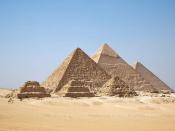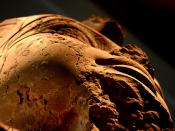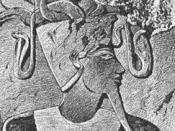Amun began as a minor god of Thebes, whose fortune was linked to that of the local Theban rulers. As they grew in importance so did Amun, eventually reaching the status of "Supreme God." Good morning teachers and fellow students, today I will be speaking to you on the growth in power of Amun and the Amun priesthood, and their political implications. Taylor Ray Ellison tells us that Amun's growth to that of a national god mirrored the growth of Thebes, and gradually played an increasingly important political role. In the Jubilee chapel of Sensuret 1 (1965- 1920 BC) Amun is described as being the "King of the Gods." His name was found on the grave stela of the Middle Kingdom Pharaoh Intef 1 (11th Dynasty), and from then on pharaohs claimed divine right to the throne, as sons of Amun-Re. Amun became protector of the royal house. As a result, his powers and influence expanded substantially.
By the beginning of the 18th Dynasty Amun had assumed the role of god of warfare and directed the Pharaoh in his actions against the enemies of Egypt. The planning of many campaigns of conquest was credited to him: he was the essential divine inspiration behind Egypt's successful strategies. The Pharaoh Kamose claims that he undertook the campaign to expel the 5. Hyksos "through the command of Amun, the just counsels." According to historian K. M. Jonsson the priesthood received large donations in gratitude for their assistance. In the Aswan Inscription Thutmose II claimed that both Re and Amun "smite for him his enemies", and that his victories resulted because "his father Amun loved him so much more than any King who had been since the beginning." Amun is even considered to have brought about Egypts expansion into Asia Minor. As a result...


